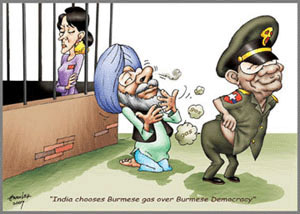India today faces an international day of protest over its support for Burma’s brutal military dictatorship. Action will be taking place in 16 countries including, Australia, Bangladesh, Canada, France, Germany, India, Japan, Malaysia, Norway, Netherlands, Philippine, South Korea, Sweden, Thailand, UK, USA. In London, a protest will take place from 12:30-1.30pm, at the Indian High Commission, India House, Aldwych, London, WC2B 4NA.
India has been moving increasingly close to the regime in Burma, supplying arms, loans, and making significant investments in the country.
The most significant investment is India’s involvement in the massive Shwe gas project, which will include a gas pipeline running to India. Indian companies ONGC Videsh (Oil and Natural Gas Company Videsh, India), and GAIL (The Gas Authority of India Limited, India) are partners in the gas project being led by South Korea’s Daewoo. The project is expected to become the regime’s largest single source of revenue, providing, on average, US$580 million per year for the regime for twenty years, or a total of US$ 12 billion. “Indian companies investing in the Shwe gas project are funding a regime that tortures, rapes, kills our people,” said Maung Zan from the All Arakan Students and Youth Congress. “India should not be investing in Burma.”
Three main factors that drive India’s foreign policy towards Burma. Human rights and democracy is not one of them. Instead, India has prioritised economic interests, particularly access to Burma’s significant gas deposits, its desire to counter Chinese influence in Burma and its need for cooperation from the regime to help tackle insurgents in the north-east of India, some of whom have bases across the border in Burma’s jungles.
“The world’s largest democracy has abandoned Burma’s democrats,” said Zoya Phan, Campaign Co-ordinator at the Burma Campaign UK. “India should be ashamed of what they have done, supplying money and weapons to one of the world’s most brutal regimes. They have chosen dictatorship over freedom, and when we do have democracy we won’t forget the disgraceful role India played in propping up the dictatorship.”
For more information contact: Zoya Phan, Burma Campaign UK, 020 7324 4712, or Maung Zan, All Arakan Students and Youth Congress.
Also available – a background briefing paper and a hard-hitting cartoon showing Indian Prime Minister Manmohan Singh begging Than Shwe for gas.
ABOUT BURMA
Burma is ruled by one of the world’s most brutal military regimes, a dictatorship charged by the United Nations with a “crime against humanity” for its systematic violation of human rights against their own people. The National League for Democracy (NLD), led by Nobel Peace Laureate Aung San Suu Kyi, won a landslide victory in Burma’s 1990 election. The result has never been honoured.
Facts about Burma:
• One of the highest levels of forced labour in the world.
• Rape is used as a weapon of war against ethnic women and children.
• More than 1,100 political prisoners, many of whom are routinely tortured.
• More child soldiers than any other country in the world.
• Nearly half the government budget spent on the military.
• One in ten babies dying before their fifth birthday.
• Over 60% of Burmese people living in poverty.
After Burma’s current military rulers, the State Peace and Development Council (SPDC), seized power in 1988, the regime used revenue from foreign trade and investment to double the size of the army while at the same time reducing spending on health and education. Burma now has the lowest spending on health in the world.

